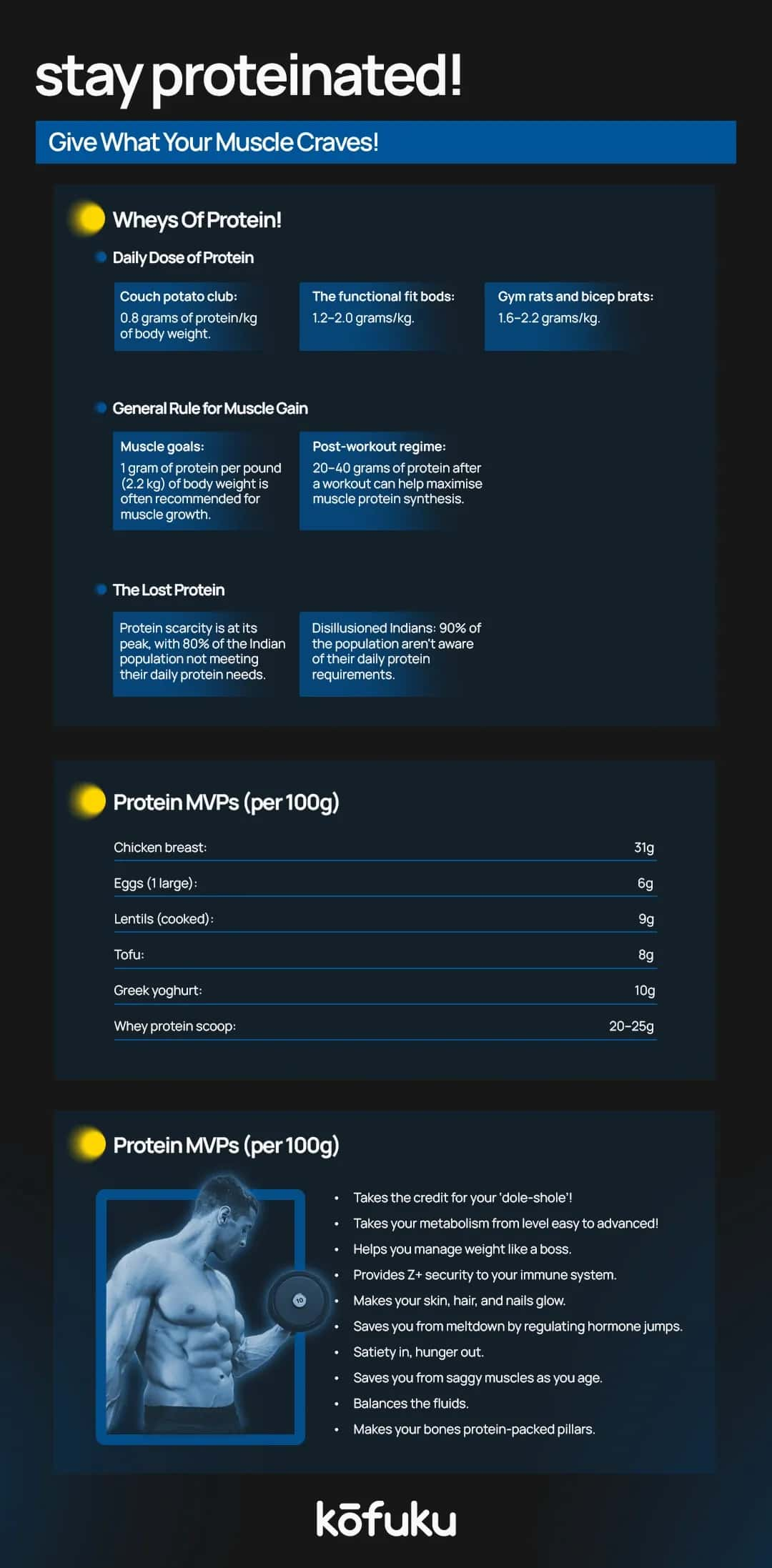How Much Protein Is Needed To Build Muscles?

Introduction
They say abs are built in the kitchen, and protein is the main driver for muscle growth. It’s the undisputed king of nutrients, the building block of muscle tissue, and a vital player in recovery, growth, and general performance.
Whether you're a beginner starting your fitness journey or a seasoned athlete fine-tuning your diet, understanding how much protein you need is essential to getting results.
So, let’s take a look at what protein is, why it is so important for muscle growth and recovery, and most importantly, how much of it you should consume every day!
What is Protein?
Protein is one of the most important nutrients our body needs. It helps build and repair tissues, supports immune function, and plays a key role in everything from skin and hair health to making enzymes and hormones.
But most importantly for fitness lovers, protein is essential for building muscle. Whether it comes from eggs, chicken, paneer, or a protein shake, getting enough of it is paramount if you're trying to grow stronger and look like the next Dwayne Johnson.
Why Is Protein Important for Muscle Growth?
Protein is made up of amino acids, which are often called the "building blocks" of the body. Look at the back of any whey protein box, and you’ll see the names of all the amino acids that honestly sound like Harry Potter spells.
When you work out, especially during resistance or strength training, you create small tears in your muscle fibres, often called microtears. Protein helps repair these tears and makes the muscle fibres thicker and stronger in the process.
Without enough protein, your body can’t repair or build new muscle effectively, no matter how hard you train.
How Much Protein Do You Really Need?
This is one of the most debated topics in the fitness world. You’ve probably heard different people say different measurements like:
“One gram per pound of body weight”
“Two grams per kg”
“Eat as much protein as possible!”
So, what does science actually say?
General Guidelines:
The Recommended Dietary Allowance (RDA) for protein is:
0.8 grams per kg of body weight per day
However, this is the bare minimum to prevent deficiency, NOT enough for someone trying to build muscle.
For Muscle Growth:
Most research supports 1.6 to 2.2 grams of protein per kg of body weight per day (or 0.7 to one gram per pound) for people who regularly strength train.
For Example:
If you weigh 70 kg, you should aim for 112g to 154g of protein per day.
This range is where muscle protein synthesis (MPS) is maximised. Consuming more than this generally doesn’t lead to significantly more muscle gain, but might have other benefits (like satiety or preservation during fat loss), although it is not guaranteed.

Factors That Influence Protein Requirements
Training Intensity and Volume
The harder and more frequently you train, the more protein your body needs to recover and grow. High-volume strength training increases muscle breakdown and will demand more repair, so you’ll have to consume more protein.
Age
As we age, we become less efficient at processing protein, a phenomenon known as “anabolic resistance.” Older adults may need to consume up to 2.0 grams/kg or at times even more to maintain and build muscle mass.
Calorie Intake
-
If you’re in a caloric surplus (eating more calories than you burn), your protein requirements may be slightly lower since the body has enough energy for muscle-building.
-
If you’re in a caloric deficit (trying to lose fat), protein needs to go up to 2.3–3.1g/kg of lean body mass to preserve muscle.
Body Goals
Someone trying to bulk up (gain muscle) might get by on 1.6–2.0g/kg. But someone trying to lean out (cut fat while maintaining muscle) might need to consume more protein daily.
Quality Over Quantity: Not All Proteins Are Created Equal
It’s not just about how much protein you eat, but also what kind.
High-Quality (Complete) Protein Sources:
These contain all 9 essential amino acids your body can’t produce on its own.
-
Animal sources: Chicken, eggs, dairy, beef, fish
-
Plant-based sources: Soy, quinoa, buckwheat
If you’re vegetarian or vegan, combining protein sources (like dal + rice or peanut butter + whole grain bread) helps ensure you get all essential amino acids.
When Should You Eat Protein?
Timing matters, but not as much as you might think. What’s more important is total daily intake. That said, there are some strategic windows you can consider:
Post-Workout (Anabolic Window)
Consuming 20–40g of protein within 30–60 minutes post-workout can help maximise recovery and muscle growth according to some studies.
Evenly Distributed Across Meals
Rather than eating all your protein in one sitting (which is not recommended), studies show it’s better to distribute intake evenly across three to five meals. This helps maintain a steady stream of amino acids and stimulates muscle protein synthesis throughout the day.
What About Protein Supplements?
Whole food should be your primary source, but supplements like whey protein or plant-based powders are great for convenience and meeting your protein goals! Especially post-workout or when you're on the go.
Whey Protein
-
Fast-digesting
-
Rich in leucine (key amino acid for muscle growth)
-
Ideal post-workout option
Plant-Based Powders
-
Good alternatives for vegans or those with lactose intolerance
-
Choose blends (like pea + rice) to ensure a complete amino acid profile

Common Myths About Protein and Muscle Building
Myth 1: “You can only absorb 30g of protein per meal”
Truth: Your body may use protein differently at higher doses (more for energy or storage), but it doesn’t "waste" protein. Large meals with more than 30g can still contribute to your overall daily needs and muscle synthesis.
Myth 2: “More protein = more muscle”
Only to a point. Once you hit your protein requirement, eating more won’t speed up muscle growth. You have to train hard, eat well, and recover properly.
Myth 3: “Too much protein is bad for your kidneys”
This concern applies only to people who read WhatsApp news and for people with pre-existing kidney conditions. For healthy people, high-protein diets are safe, even over long periods, which is supported by multiple studies.
Tips to Hit Your Protein Goals
-
Start with breakfast: Add eggs, Greek yoghurt, or protein smoothies.
-
Snack smart: Nuts, boiled eggs, cheese cubes, or protein bars.
-
Double up at meals: Include multiple sources like chicken + paneer + dal.
-
Track your intake: Use apps to monitor how much protein you're actually eating.
Conclusion
Protein is essential for muscle building but is not the only puzzle piece. You must consistently do resistance training, rest properly, and have an overall balanced diet.
To summarise:
-
Aim for 1.6–2.2g of protein per kg of body weight per day for muscle growth.
-
Focus on high-quality protein sources.
-
Distribute your intake throughout the day.
-
Use supplements if needed, but don’t rely on them alone.
Muscle isn’t built in a day. Stay consistent, train smart, and fuel your body right, and the Salman Khan results will follow!
FAQs
Q. How much protein is required for hypertrophy?
A. Body Weight Daily Protein for Hypertrophy
60 kg (132 lbs) 96 – 132 grams 70 kg (154 lbs) 112 – 154 grams 80 kg (176 lbs) 128 – 176 grams 90 kg (198 lbs) 144 – 198 grams
Q. Is there something, such as too much protein?
A. Yes, if you eat well beyond 2.2g/kg body weight, your body doesn't build more muscle—it just uses it for energy or stores it as fat. Better after a limit.
Q. When is the best time to eat protein for muscle growth?
A. The best approach is to spread protein intake evenly throughout the day, about every three to five hours. Most important is your post-workout meal, ideally within 30–90 minutes after training, containing 20–40g of high-quality protein.
Q. Do I need protein supplements?
A. Not necessarily. Whole food sources are the best.
Q. How do I ingest protein supplements?
A. Mix them with water/milk before consumption.


The Legend Behind Protein Powders – Fact vs. Fiction

Comprehensive Guide to Superfood Nutrition for Better Health

What To Eat Before And After A Workout?

Healthy Family Nutrition Tips for Strength and Togetherness

Sustainable Weight Loss Tips to Achieve Long-Term Fitness Goals


